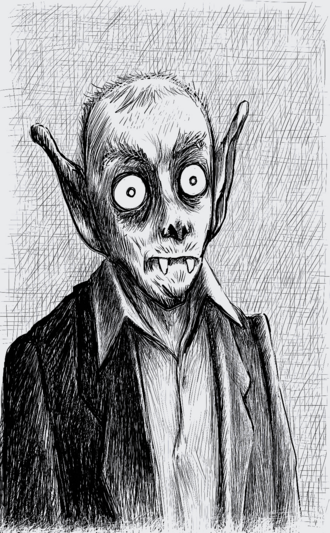Vampire

Vampires are monsters in legends and stories. The first vampire stories were told in Eastern Europe, but much of how modern people see vampires was created by Bram Stoker in the famous novel, Dracula. Few people believe that vampires are real, but they are still very popular in movies, television, and books.
Vampires were once people but have a supernatural curse. Some vampires must drink blood to survive. They do this by biting people or animals on the neck with their two long fangs. People who are killed by having their blood drunk by vampires may also become vampires. Others can live off the life energy of people. In many stories, vampires can change into other animals, usually bats, though also wolves, cats or rats.
Depending on the story, vampires may have some or all of these characteristics:
- They cannot go out in sunlight, so they sleep during the day.
- They can only be killed in certain ways:
- They can be weakened by crosses or other religious symbols, garlic, holy water, and silver.
- They cannot cross the ocean unless they are in a coffin surrounded by soil from their homeland.
- If vampires click their fingers they can disappear in the blink of an eye.
- If a bag of rice, grain, seeds or other similar substance is spilled on the ground, a vampire will have to count every grain.
- They have no reflection in glass, mirrors, or other things.
- Vampires have photographic memory.
- Vampires are cold blooded, if once they touch the wound will go.
Vampires in fiction
Dracula is the most famous vampire in fiction, and many movies have been made about him, often with Christopher Lee as Dracula himself. Bela Lugosi is another actor known for the role. Nosferatu is also a famous vampire movie.
There is a popular series of books by Anne Rice about vampires. Stephen King also wrote about vampires in the 1970s in Salem's Lot. The television show Buffy the Vampire Slayer featured a young girl who fought vampires, but also befriended good ones. The series Twilight by Stephenie Meyer is also about vampires. The movie The Lost Boys was about a band of vampires in California. Among many other stories about vampires are The Southern Vampire Mysteries, which led to the television show True Blood.
Protection
In stories, garlic is often used for keeping vampires away, but it does not actually affect them. Vervain is used to hurt vampires, and in Europe, Though this is not traditional, mirrors have been used to make vampires stay away (in some cultures, vampires do not have a reflection and sometimes do not have a shadow, perhaps as a way of showing that they do not have souls).[1] Not all vampires in stories have this quality (the Greek vrykolakas/tympanios had both reflections and shadows), was used by Bram Stoker in Dracula. In addition to this, in Bram Stoker's Dracula, it is mentioned that wolf's-bane (or Aconitum) can be used to repel dracula. The reason for this in the novel it is explained dracula is the Wolfman, and can transform into one just as easily as a bat.
Other
Some neurologists believe that rabies might lie at the base of the myth.
- Rabid people have trouble walking.
- They are sexually very active and can be aggressive. They may bite, while they are in this frenzy.
- Very often they have cramps, or seizures. They often bite their tongue during such cramps. This may lead to them bleeding from their mouth.
- Rabies can be spread by biting
- Many diseases of the brain make people sensitive to light.
- Many diseases of the brain make people have difficulty swallowing. This is the fear of water.
The problem with this is that rabid people, especially in advanced stages of the disease, will live for about ten days, at best. This does not account for them getting out of ditches and graves over weeks or months.
Another explanation was given by other people. The disease might be porphyria, rather than rabies. Porphyria is a genetic condition that leads to differences when the body makes blood. Some parts of the blood can not be made in sufficient quantities. Writers for the Toronto Garlic Festival say people with porphyria do not like to eat foods that have sulfur in them, and garlic has sulfur in it.[2]
Psychological disorders can contribute to vampiric behavior. As well as the fact that drinking blood has always been believed to give you the strength of the one you drink from. That belief stems all the way back to ancient civilizations.
There are people in the real world who like to dress and behave like a vampire. Some of them may also drink blood.
Finally, there is the vampire bat.
References
| Wikimedia Commons has media related to Lua error in Module:Commons_link at line 62: attempt to index field 'wikibase' (a nil value).. |
- ↑ Spence, Lewis (1960). An Encyclopaedia of Occultism. New Hyde Parks: University Books. ISBN 0486426130. OCLC 3417655.
- ↑ "Why Vampires Hate Garlic". Toronto Garlic Festival. Retrieved July 16, 2020.
